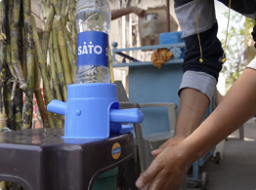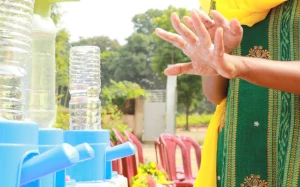
By Jason Cardosi, Leader, Partnerships
The world is facing a wave of humanitarian challenges. Prompted by natural disasters, conflict and the spread of diseases, humanitarian supply chains are stretched.
Today one out of every thirty-three humans require humanitarian assistance or protection [1], and over 100 million people around the world were displaced by conflict in 2022 [2]. The surge in required support includes sanitation and hygiene, the lack of which can quickly bring a range of health risks including acute diarrhoea – one of the most common causes of child morbidity and mortality in refugee settings [3].
Tackling these challenges requires leadership from governments, and coordination among humanitarian and development agencies and the private sector. We believe that private industry plays a critical role in accelerating the availability of solutions, and it’s a role that SATO is embracing. A recent report on the opportunities for innovation in WASH and humanitarianism by Elrha found that procurement processes pose a significant challenge, with international shipping frequently being costly and delayed [4]. As a result, humanitarian partners often prefer to procure their sanitation and hygiene solutions from local markets that cater to their requirements and can respond rapidly. SATO’s market in-market presence and manufacturing footprint contributes to these local response networks.
Leveraging LIXIL’s heritage in new product development, innovation, and reliability, we recently launched the SATO Slab – an easy-to-transport, sturdy and easy-to-clean platform that quickly creates a safe and pleasant toilet. Like all our products, it has an accessible design, with raised bumps that provide a pathway for the visually impaired and non-slip foot plates.
When designing this product, we aimed to create a solution that would be easily deployed, highly durable and pleasing to use. We worked towards the needs of our partners and users who were demanding alternatives to fragile and non-durable solutions that lead to declining sanitation and hygiene standards.
In these scenarios, end-to-end solutions, such as those provided by SATO, alleviate pressures on the humanitarian sector by providing safe and secure alternatives. The SATO Pan and Stool creates an improved facility, uses far less water than a traditional pour flush, and prevents smells and insects. The SATO I-Trap can connect to an offset pit or septic system and the V-Trap allows workers to seamlessly direct human waste to separate pits, meaning that while one pit undergoes treatment and emptying, another can be allowed to fill up – keeping the vital system in non-stop use.
The SATO Slab can facilitate the rapid and affordable construction of strong, sturdy toilets, helping to combat pressures exerted by excessive use of a small number of toilet facilities. The SATO Slab fits seamlessly with a SATO Pan and a Stool if needed. Designed to support the weight of any consumer, the Slab is reliable and built to last. It offers a solution to construct sanitation solutions at scale with minimal time and effort.
As a social business, our aim has always been to provide solutions so our users can improve their lives wherever they live. We are grateful to be working with humanitarian and development agencies, governments, and private stakeholders to contribute to improving sanitation in humanitarian settings.
[1]UNICEF: Global Annual Results Report 2020: Humanitarian Action (2021), p2
[2]UNHCR: Figures at a glance (June 2023)
[3]Travel Medicine and Infectious Diseases: Risk factors for acute childhood diarrhoea: A cross-sectional study comparing refugee camps and host communities in Gambella Region, Ethiopia (2019)
[4]Elrha: Humanitarian procurement – challenges and opportunities in the adoption of WASH product innovations (2021), p.11







